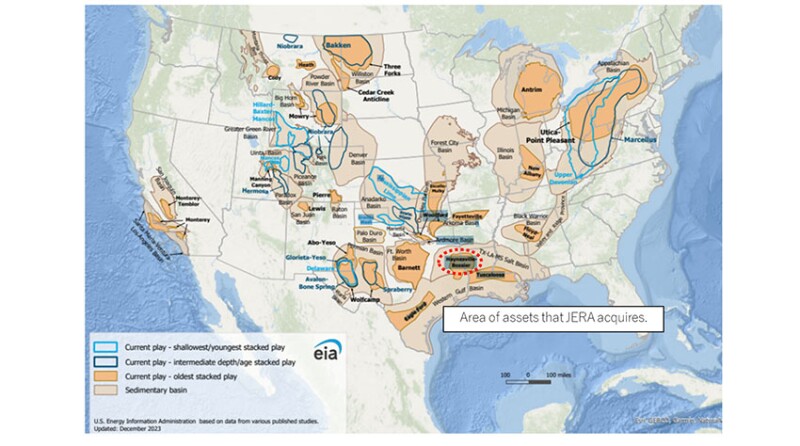Building on its strategic expansion into the US energy market, Japan’s largest liquefied natural gas importer and electricity producer JERA has launched its first foray into the US upstream after having acquired the South Mansfield shale gas asset in Louisiana’s Haynesville Basin for $1.5 billion.
In a 23 October announcement, JERA said its US subsidiary, JERA Americas Inc., had purchased 100% of shares of South Mansfield E&P, the Williams-owned company that held upstream rights and worked jointly with GEP Haynesville II as majority owner and operator before the acquisition.
The acquired assets span the Haynesville and Mid-Bossier formations, producing more than 500 MMscf/D of gas across 210 km2, with 200 undeveloped drilling locations and established infrastructure for gathering and transportation.
JERA, a joint venture between Tokyo Electric Power and Chubu Electric Power, said it plans to double total output to 1 Bscf/D through future investments, leveraging the asset’s proximity to the Gulf Coast’s LNG terminals and data center markets.
Largest US LNG Offtake Agreement
In June, JERA signed what it called the largest single-buyer US LNG offtake agreement—5.5 mtpa for 20 years—involving various sale purchase agreements with US LNG producers including NextDecade, Commonwealth LNG, Sempra Infrastructure, and Cheniere Marketing.
JERA also has long-term offtake contracts with Freeport LNG in Texas in which it also holds a 21.9% stake in terminal operator Freeport LNG Development through its subsidiary Gulf Coast LNG Holdings. JERA had acquired a 25.7% stake in 2022 for $2.5 billion and later sold part of that stake to Japan Petroleum Exploration (Japex), the company said in a news release.
The Japanese power giant also holds interests in 10 US power-generation assets and major energy transition projects, including a 35% equity stake in the $4-billion Blue Point development in Ascension Parish, Louisiana, which targets production of 1.4 mtpa of low-carbon ammonia from natural gas and carbon capture and sequestration.
Construction of the facility was to begin in 2025 following a final investment decision taken by the joint venture partners, CF Industries, JERA, and Mitsui & Co in April.
Commenting on the Haynesville acquisition, John O’Brien, CEO of JERA Americas, described the buyout as a “strategic addition” that enhances JERA’s upstream portfolio and “deepens our commitment to America’s energy future.” Ryosuke Tsugaru, JERA’s chief low-carbon-fuel officer, said the investment supports diversification while lowering market risk.
In September, JERA also signed a letter of intent to "advance discussions" on offtaking LNG from the proposed $44-billion Alaska LNG project, which expects to complete a front-end engineering and design study by December.
Tokyo Gas in Haynesville
In April, Tokyo Gas, through its US subsidiary TG Natural Resources (TGNR), purchased together with Castleton Commodities International a 70% stake in Chevron's east Texas gas assets which extend into the Haynesville Shale formation near Louisiana. Castleton holds 7% of TGNR.
The acquisition added more than 250 gross locations to TGNR’s existing Haynesville inventory based on an assumption of four wells per section. The acreage is relatively underdeveloped and currently supported by shallower production, which helps reduce parent-child well interference, according to a press release by TGNR and Tokyo Gas.
The sale for $75 million in cash and a $450 million capital carry to fund future Haynesville development builds on TGNR’s $2.7 billion acquisition in 2023 of Rockcliff Energy from Quantum Energy Partners, which overnight quadrupled production to 1.3 Bcf/D from 330 MMcf/D, given the block’s location adjacent to TGNR’s existing blocks, according to Tokyo Gas.
Kosuke Tanaka, head of JERA’s LNG division, told NikkeiAsia that his company’s Haynesville deal had been in the works since March and is unrelated to US President Donald Trump’s visit to Japan at the end of October for talks with new Prime Minister Sanae Takaichi.
He called the timing of the announcement a “coincidence” but said that he did not know if the $1.5-billion deal would be folded into the $550 billion that Tokyo agreed to invest in the US during trade negotiations in September.


